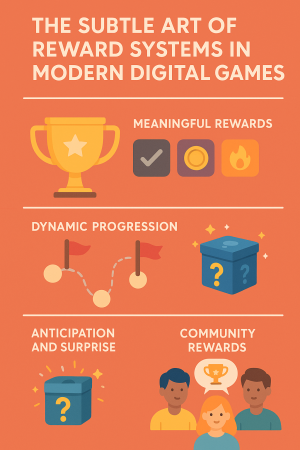Reward systems have become the heart of modern digital games. Whether it’s an indie puzzle title or a sprawling multiplayer RPG, the method by which a game rewards players usually determines how long they stay engaged, how deeply they connect with the experience, and finally, how memorable that experience becomes. Today’s gaming landscape is filled with titles that not only entertain but also shape player behavior through well-designed incentives and progression mechanics.
But what truly makes reward systems so powerful is not just the thrill of getting something of value in-game, but rather the psychology behind how those rewards are delivered. Developers increasingly treat rewards as an advanced craft that melds together behavioral science with storytelling and game economy design.
The Best Games of Today Know That Rewards Should Be Meaningful
The greatest games of today, at times, give prizes reasonably frequently for accomplishing anything, such as an achievement, a loot drop, an ability unlocked, or even completing a story milestone. The joy of receiving your reward is maximized when these rewards are tied directly to an action you took. Instead of arbitrarily rewarding you and/or giving rewards to you too frequently, the best games provide carefully measured pacing to intrinsically make each reward feel like a reward!
A major influence in this area has come from the broader world of digital entertainment, where platforms such as online-casinos.com best slot sites have demonstrated how progression models, probability mechanics, and variable rewards shape user engagement.
While the mode of interaction differs between video games and casinos, the psychology behind anticipation and progression remains universal. These patterns have helped inform how modern game studios refine their reward loops, balancing excitement, fairness, and long-term player motivation.
This same shift toward thoughtful design can be seen in Canada for 2025, where transparency and responsible reward structures are becoming central expectations for players.
Balanced reward systems ultimately guarantee that players will be motivated for a long time without becoming exhausted or feeling coerced. It is a fine line to walk, but if done properly, it transforms what could be a rote, flat gameplay experience into a deeply compelling experience that brings gamers back time and time again.
The Transformation of Progression: Linear to Dynamic
Earlier generations of games generally used a very linear approach to rewards. Players would generally progress through levels, rack up points, and, on occasion, obtain a new ability. Today, progression has transformed from very linear approaches to much more dynamic, branching off into multiple paths of progression for different playstyles.
Open-world titles allow players to decide for themselves if they want to pursue story-driven progression, progression based on exploration, upgrades for crafting, or completed social tasks. In multiplayer gaming, there are season passes, ranked tiers of competition, and cosmetics achieved through skill and dedication. Even “casual” mobile games have layered progression to engage users continually throughout the day and engage them tomorrow.
Dynamic progression is a reflection of modern gamers who want flexibility in the progression system. Gamers don’t want to only want to progress up a ladder; they want to feel in control of their progression. It mirrors the larger context of dividends in digital ecosystems, where personalization and user autonomy are often central pillars in design.
Anticipation and Surprise: Grasping the Psychological Processes
Maybe the most intriguing thing about rewards is the feelings of anticipation they can produce. The surprise aspect of the reward, especially in the form of a random reward (think mystery boxes, loot crates, or gacha-style rewards), invokes an emotional response because of the inherent randomness and excitement.
While this can be a contentious approach, it can enhance engagement when used responsibly and without diminishing the player experience. The key is transparency, fairness, and making sure that randomized rewards complement rather than dominate a game’s core progression loop.
Increasingly, game developers integrate both predictable and unpredictable rewards to keep players emotionally engaged. A consistent flow of predictable rewards establishes structure, while unpredictable rewards introduce uncertainty and create moments of delight. As in many areas of digital entertainment, it’s this mixture of predictable and unpredictable rewards that is unique to gaming because it fosters a more player-centric experience.

Community Rewards and Social Development
Contemporary reward systems focus less on the accomplishment of an individual player. Many games today have community events, communal objectives, or collaborative tasks that reward player groups. Rewards become a social experience, providing players with the motivation to work together and experience the feeling of being part of a community.
Seasonal events, quests for the whole server, or global goals for the community to complete are common. These events create communal excitement and serve as the impetus for players to check in on the game throughout the year.
This growing emphasis on the social aspect of progress demonstrates how digital entertainment has shifted to a more interconnected experience, where players want to share achievements, celebrate community wins, and feel connected to a broader community progressing in the game together.
The Future: More Player Choice and Variety, More Personalisation
As the landscape of gaming continues to change, reward systems will become more player-focused than they have ever been before. More developers are experimenting with adaptive reward: paths that respond to player behaviour, time played, and player-reported mechanics of choice. Personalised quests, dynamic loot balancing, and adjustable difficulty levels together form reward systems that really feel tailored.
And with technology allowing for richer analytics and feedback loops for players, the future of rewards focuses upon flexibility and fairness: incentives for the player that enhance gameplay in a way that is not so prescriptive.
The art of reward design is ultimately about more than just giving gifts: it is about creating moments, shaping motivations, and guiding players through an experience that is both exciting and meaningful. With all of the innovations in modern digital games, reward systems will persist as one of the most engaging components of gaming as an entertainment form.

